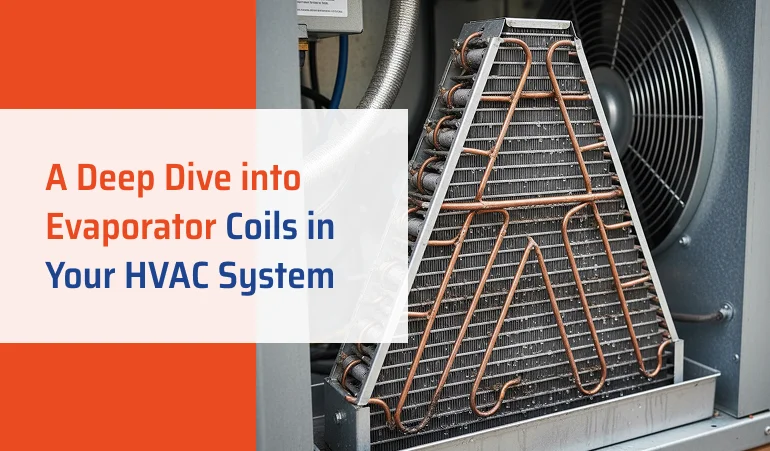Contact Info

Evaporator coils are one of the most important yet overlooked components of HVAC systems in Pennsylvania. Whether you own a house in Bethlehem or a business in Allentown, technical knowledge of the evaporator unit can help you keep your HVAC equipment at its best performance. Also, if you take maintenance steps on time, you can prevent costly HVAC repairs in PA, which are one of the primary headaches in Pennsylvania.
This guide will cover the basic knowledge of evaporator coils, common types in Pennsylvania, the frequent issues, and the practical steps to keep them working at optimal efficiency.
Evaporator coils are the unsung heroes of HVAC systems that play a pivotal role in the comfort of a space. They are located inside or near the air handler unit. They complete the cooling cycle, working with the condensation lines and the refrigerant.
An evaporator coil works by absorbing heat from the air, which is then transferred within the home or out of the home, creating a cooling or heating effect. This heat converts the liquid refrigerant into a gas, which is then moved to the other unit, where heat is released.
In Pennsylvania, with humidity levels up to 70-75%, these coils also absorb moisture from indoor air, contributing to enhanced comfort and preventing fungal growth.
Although every evaporator coil performs the same function, they are not identical. The contractors favor various coil designs for a specific space over others because of their efficiency, mechanism, and space savings. The following are the three most common coil designs in Pennsylvania.
As the name implies, they have an alphabet letter “A” shaped appearance. This is the most commonly used evaporator coil in many areas. They are ideal for vertical air handlers and are often used in residential HVAC systems.
This is, in fact, a folded and improved version of A coil. They are efficient and innovative coil designs best suited for compact spaces like apartments or small homes. They have an increased surface area and are easy to clean and maintain.
You might have seen these flat coils in commercial rooftop units in Allentown or Easton, PA. They are best suited for horizontal systems in crawlspaces, attics, and other spaces where there is not enough space for bulky A coils.
Pennsylvania Insight: In Pennsylvania, older homes and residential buildings generally use A coils, while the modern, commercial facilities are more inclined toward N or slab coil designs.
Apart from the shape and design, the composition materials of the coil also influence the efficiency. There are two widely used options in this regard;
Due to its extraordinary thermal conductivity, copper can release heat effectively. At the same time, it is a soft metal and therefore it is more prone to small leaks due to corrosion. These leaks compromise the efficiency and are difficult to find during normal inspection.
Aluminum has evolved as the best alternative for corrosion issues that arise with copper. Although it has less conductivity than copper, the modern designs with increased surface area can make up the things. Aluminum coil is also cost-effective compared to copper coil.
Pennsylvania’s unique climate is very brutal for evaporator coils. From below 0°F during cold snaps in January to above 90°F during July, HVAC systems have to bear a lot of strain each year. All this leads to multiple issues in an evaporator coil; some of them are mentioned below;
Refrigerant Leaks: It may be a result of corrosion, vibration, or regular wear and tear.
Frozen Coils: It may be due to restricted airflow, low refrigerant levels, or a faulty blower fan.
Dirt Buildup: It may be due to high levels of humidity, seasonal allergens, or low maintenance.
Clogged Drain Lines: The primary causes include algae and fungal growth, dirt, and debris etc.
In southeastern Pennsylvania, average indoor humidity can exceed 60% which promotes corrosion and microbial growth in evaporator lines.
When an HVAC system gets into faults, it shows some alarming signs. These signs often go unnoticed until they emerge as significant concerns. Especially in the countryside areas, initial signs are left ignored and ultimately lead to costly residential HVAC repairs in PA. Here is what you should never neglect;
Regular maintenance, tune-ups, and servicing are the key to keeping residential or commercial HVAC repairs in PA at bay. Maintenance also keeps the system performing at its peak and reduces energy consumption. Here is a comprehensive maintenance checklist for both homeowners and business owners.
Dirty coils can reduce HVAC efficiency by 30% directly increasing the energy bills. Cleaning and maintaining coils can bring you closer to energy-saving goals.
When you notice any issues with your evaporator coils, Lehigh HVAC can fix them for you. Our NATE-certified technicians have more than 11 years of experience in this field. We work with all the HVAC brands and models and offer you GreenSky 0% financing, rebates, and easy monthly installments. Get in touch with us at 484-961-7044.